It’s your child’s first year of swimming and you’re already feeling lost. You have no idea what a flip turn is. Or how to read a heat sheet, let alone understand swim meets or swim practices.
Welcome to being a new swim parent! 🙂
The good news? You’re not alone.
You have a support system all around you! From other swim parents to the coach, and even here!
To get you started, here are 13 things you learn as a new swim parent.
Disclosure: This post may contain affiliate links, meaning we earn a small commission at no cost to you if you purchase something through one of our links. As an Amazon Associate, we earn from qualifying purchases. Please check out our disclosure page for more information.
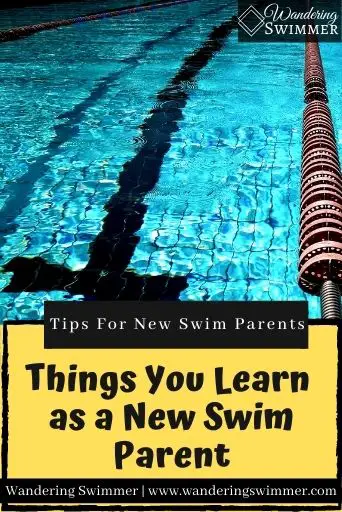
1. Swimming Terminology
Swimming, much like any sport, has dozens of new words. From tapering to open turns vs flip turns. And everything else in between!
As a new swim parent, you need to learn swimming terminology!
This not only helps you communicate better with your swimmer, but it also keeps you from feeling lost.
Related articles:
2. Your Monthly Budget Will Increase
Swimming cost money. No way around it and we’ll just be upfront about it. When your child first starts swimming, you have a vague idea of the cost.
As the months tick by though, you’ll find yourself paying for various swimming related expenses.
We will note though these do vary by the type of team your child joined. Some teams, such as high school and summer league teams, don’t have monthly dues or meet fees.
- Annual registration
- Monthly dues
- Swim meet fees
- Equipment (fins, kickboards, buoy, etc.)
- Swim gear (swimsuits, caps, goggles, etc.)
Grocery Bills
Swimmers eat. A lot.
This becomes especially true right after practice or a meet. For everything else in between, you’ll find your kitchen looking a lot more lean than it used to!
One thing a new swim parent should know is that, yes, this is normal.
More Content for You: Swimming on Your Period FAQ
Swimming burns hundreds of calories each practice and your child needs to replace these. Food is fuel. And it will also aid in the building and recovery of muscles right after practice.
Some advice?
Your swimmer should also eat a small, healthy, protein-packed snack immediately after practice and the conclusion of a meet. Don’t let them wait until you get home to have them eat. In doing so, they’ve missed the limited window for muscle recovery.
Car Expenses
While you probably factored in the cost of dues and food, you probably didn’t think about gas costs.
To put it another way, you’re now a personal shuttle for your child. You’ll drive them and from practice, and swim meets.
Add that into your regular work commute and you can expect to see some road time. Some good news? With morning practice, you’re typically the only one on the road 🙂
3. Your Personal Time Will go Down
Your bills will go up and your personal time will go down.
Swimming takes up your swimmer’s time. But it will also take up your time. New swim parent or not. Between practice, meets, the commute between them all, you’ll find yourself down at least an hour each day.
Add in weekend long meets and you can say goodbye to the weekend.
4. You Don’t Have to Stay and Watch Them Practice
You can save yourself some time by not staying at the pool during practice.
Because let’s be honest here. Practices are boring to watch. It’s not a requirement that swim parents stay at the pool and observe. Instead, take these moments to get some time back for yourself.
Related articles: (coming soon)
- 8 Things Every Swim Parent Should Know
- Practice Etiquette for Swim Parents
- 8 Things to do During Your Child’s Swim Practice
- Why You Shouldn’t Stay at Your Child’s Practice
Some more truth? The coaches and swimmers would actually prefer it if you left. Having parents on deck at practice or even watching in the stands can cause a distraction.
5. Swim meets are Long (and Loud)
And not just the actual meet itself. Because you arrive before the meet starts to stretch, change, and warm up. Then you wait. And wait. And wait some more.
It’ll take your child about a minute to five minutes to swim their race. Conversely, it’ll take 4 hours of waiting for that one race.
Related articles:
Be prepared with snacks, drinks, and entertainment. Both for yourself and your swimmer. And maybe a cushion to sit on. Those seats aren’t always the most comfortable for hours on end 😉
6. You’ll need pens, sharpies, and highlighters at a meet
Despite what you may think, you’ll need some writing materials at swim meets. As a rule of thumb, you should stay stocked in at least sharpies.
As a means of remembering when they swim, swimmers write their events on their arms or legs. This includes what heat and lane their in. You’ll see this most in younger age group swimming and summer leagues.
Related articles:
Some older swimmers may refer to Meet Mobile for event information. However, the sharpie is a classic and favorite still. You should always keep one on hand.
As swim parents, you can write that same information down on a sheet of paper. Or, if you have a paper copy of the heat sheet, you can highlight your swimmer’s name. This allows you to find them quickly.
7. Everyone Looks the Same on Deck
And in the pool!
At your first swim meet, it’s hard to find your child in the crowd. As a team, everyone will wear the same caps and maybe the same suit. Finding your child on deck is like playing ‘Where’s Waldo.’
More Content for You: How to Pick the Right Swim Goggles
Sometimes, the only way you can find your child is when they actually swim. And even then, you have to rely on the heat sheet to identify them. This is part of a learning curve that all new swim parents have.
With time, you’ll learn how to identify your child by their stroke alone in the water. For now though, there’s never any shame in referring back to the heat sheet.
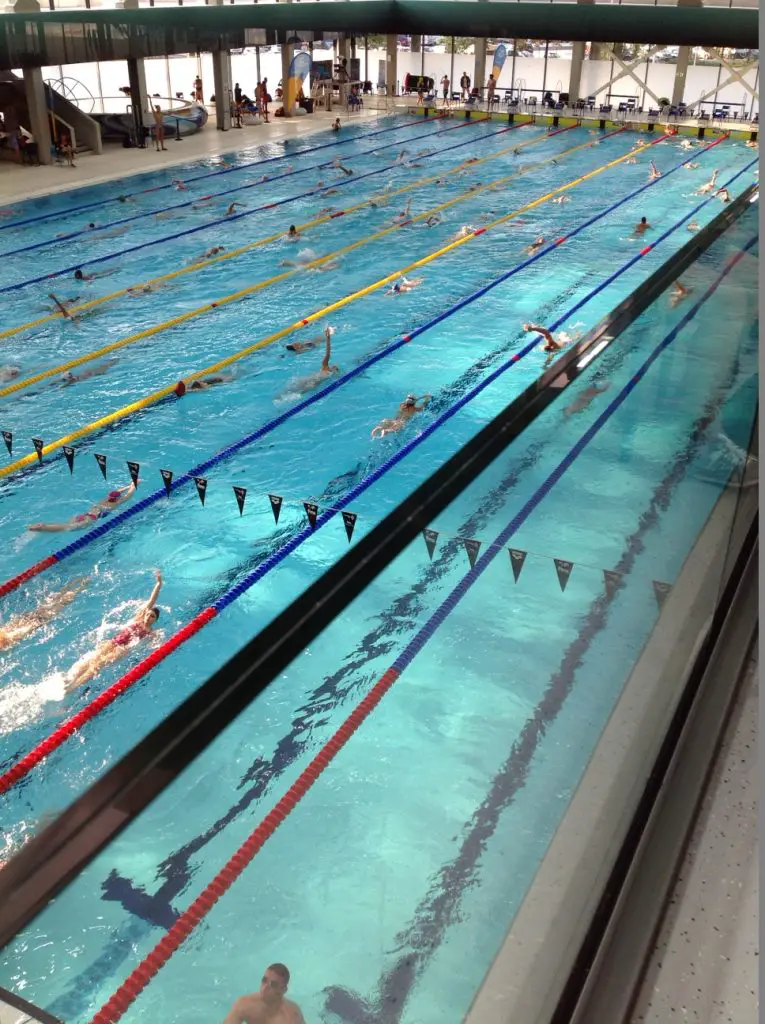
8. DQ is Not a Delicious Restaurant
Instead, it’s the bitter taste of disappointment. DQ is short for disqualification. It happens when a swimmer does something considered illegal by the swimming officials. This could be:
- A false start (leaving the block early or flinching/fidgeting on it),
- A wrong turn or stroke
- Stopping too early
- Going past 15 meters
DQ’s, while heartbreaking, are valuable lessons for your swimmer. Everyone gets them.
Related Article: Swim Meet Terminology
And yes, your heart does stop when you see the universal sign of a DQ. That hand going up behind your child’s lane. But it gives swimmers a chance to learn and grow from their mistakes
The best thing to do?
Be there for them. Don’t berate them or get in an arguing match with the official. Instead, comfort your child and help them get their head back in the meet.
Related article: How to Be a Good Swim Parent
Remember, while a DQ is never fun, it’s a great learning moment. Take it in stride as such.
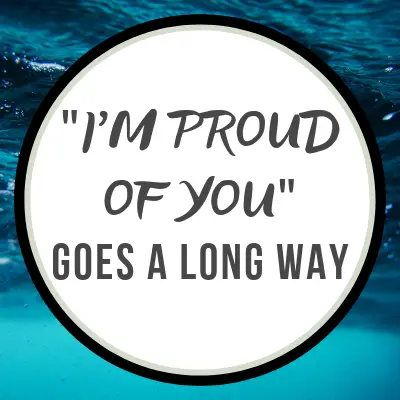
9. Personal bests (PBs) never get old
Swimmers strive to drop time everytime they race. Whether it’s their first race or 100th race. Dropping time never gets old. For both swimmers and swim parents.
There’s a thrill and sense of accomplishment when you both turn to look at the results. Swimming is the only sport that you never see the clock until the finish. That’s a long time to wait to see how you did.
A long time to know what you’ll feel. Whether they’ll feel the sting of defeat or the thrill of victory.
When they drop time, no matter what number race it is, everyone should celebrate. Be happy for them. Don’t ask why they couldn’t drop more time. Instead, allow them to enjoy that moment of success
10. Shaving down
The word that causes guys to cringe and girls to cheer.
Shaving down is the time just before a major meet when swimmers of both genders shave their body. This comes after months of not shaving. Yes, even during the summer months.
For some swimmers, this means just their legs. Others can shave down their arms as well. Guys will typically shave their chests and backs.
You can expect shaving parties, clogged drains, and some nicks along the way. Stand by with drain cleaner and band-aids.
11. Dryland
This word causes confusion for not just new swim parents, but anyone else outside of swimming.
Dryland consists of weights, cardio, and core work. All completed outside of the pool. Hence, dryland!
Yes, we know the name contradicts itself. But swimmers like the quirkiness of it. And admit it, swim parents like it too 🙂
12. You’ll Never Escape the Smell of Chlorine
It’ll permeate the fabric in your car and it’ll linger in the bathroom. Most times, you’ll feel like you never left the pool. You can try various chlorine removers and toiletries to help, but it’s never a guarantee it’ll work.
As a long time swimmer, I can say, you mostly get used to it. The smell will never go away. Even after your child showers.
The only time it does?
Once they’re officially done swimming. And even then, it takes about a month to clear it from the skin. It’s a bit sad actually, when it does go away.
13. Your Swimmer’s First Race is Just as Emotional as Their Last
While this might be your first year and it’s hard to think of a final year, it will come. And it’ll come fast. One moment, you’re watching your child struggle through the water and cheering your heart out for them.
The next, they’re moving through the water like they were born for it. You’re still cheering like crazy for them, but it’s with a bittersweet emotion. Because this time, when they touch the wall, it’s officially over.
No more practices, no more meets. The only reminders you’ll have are the memories and the physical achievements.
But that excitement and pride at what all they accomplished? That will stay with you and your swimmer for years to come.
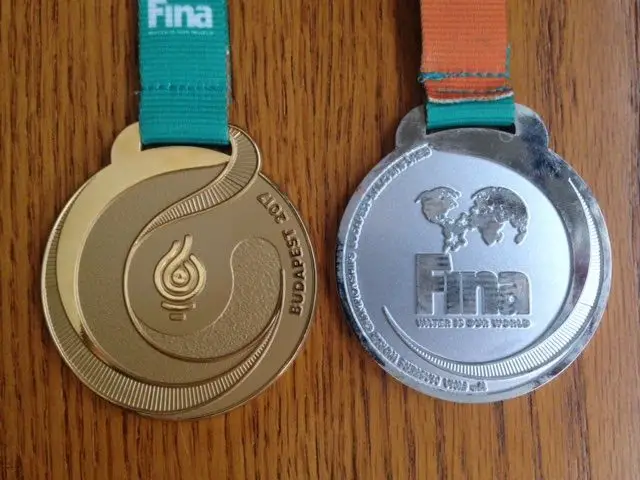
In Closing
Being new to a sport comes with a learning curve. Both for athletes and parents alike. As a new swim parent though, you’re not alone.
The honest truth is that even swim parents with years of experience learn new things all the time. Because the sport changes. It grows and develops along the way. So take pride in what you know so far. And take courage in learning more.
Questions or comments? Leave them below!
And as always, happy swimming
–Chevron
Bonus Content:
8 Things Every Swim Parent Should Know: There’s a fine line between being supportive and overbearing. As a swim parent, you need to learn how to find that balance.
How to Make Your Swimmer’s Practice a Success: How do you ensure that your swimmer has the best practice possible? And how do you fit into that role? Here are some helpful tips for you as a swim parent to help guide and encourage your swimmer to succeed at practice.

Want to Improve at the Pool?
Join swimmers and swim parents to receive my free newsletter and receive a free Swimming Glossary e-book as a thanks!
Every month you’ll receive tips and coaching to help you find success at the pool.
About
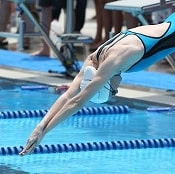
Chevron is a current competitive swimmer with almost 20 years of experience in the pool. And although she fell into the sport by accident in her high school years, she still trains daily and competes throughout the year. She’s committed to providing guidance to all levels of swimmers and believes that everyone should know how to swim.